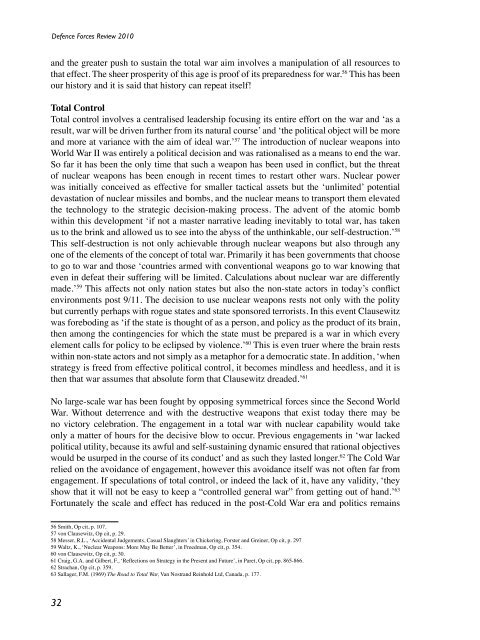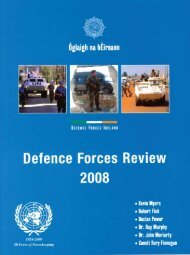Defence Forces Review 2010
Defence Forces Review 2010
Defence Forces Review 2010
Create successful ePaper yourself
Turn your PDF publications into a flip-book with our unique Google optimized e-Paper software.
<strong>Defence</strong> <strong>Forces</strong> <strong>Review</strong> <strong>2010</strong>and the greater push to sustain the total war aim involves a manipulation of all resources tothat effect. The sheer prosperity of this age is proof of its preparedness for war. 56 This has beenour history and it is said that history can repeat itself!Total ControlTotal control involves a centralised leadership focusing its entire effort on the war and ‘as aresult, war will be driven further from its natural course’ and ‘the political object will be moreand more at variance with the aim of ideal war.’ 57 The introduction of nuclear weapons intoWorld War II was entirely a political decision and was rationalised as a means to end the war.So far it has been the only time that such a weapon has been used in conflict, but the threatof nuclear weapons has been enough in recent times to restart other wars. Nuclear powerwas initially conceived as effective for smaller tactical assets but the ‘unlimited’ potentialdevastation of nuclear missiles and bombs, and the nuclear means to transport them elevatedthe technology to the strategic decision-making process. The advent of the atomic bombwithin this development ‘if not a master narrative leading inevitably to total war, has takenus to the brink and allowed us to see into the abyss of the unthinkable, our self-destruction.’ 58This self-destruction is not only achievable through nuclear weapons but also through anyone of the elements of the concept of total war. Primarily it has been governments that chooseto go to war and those ‘countries armed with conventional weapons go to war knowing thateven in defeat their suffering will be limited. Calculations about nuclear war are differentlymade.’ 59 This affects not only nation states but also the non-state actors in today’s conflictenvironments post 9/11. The decision to use nuclear weapons rests not only with the politybut currently perhaps with rogue states and state sponsored terrorists. In this event Clausewitzwas foreboding as ‘if the state is thought of as a person, and policy as the product of its brain,then among the contingencies for which the state must be prepared is a war in which everyelement calls for policy to be eclipsed by violence.’ 60 This is even truer where the brain restswithin non-state actors and not simply as a metaphor for a democratic state. In addition, ‘whenstrategy is freed from effective political control, it becomes mindless and heedless, and it isthen that war assumes that absolute form that Clausewitz dreaded.’ 61No large-scale war has been fought by opposing symmetrical forces since the Second WorldWar. Without deterrence and with the destructive weapons that exist today there may beno victory celebration. The engagement in a total war with nuclear capability would takeonly a matter of hours for the decisive blow to occur. Previous engagements in ‘war lackedpolitical utility, because its awful and self-sustaining dynamic ensured that rational objectiveswould be usurped in the course of its conduct’ and as such they lasted longer. 62 The Cold Warrelied on the avoidance of engagement, however this avoidance itself was not often far fromengagement. If speculations of total control, or indeed the lack of it, have any validity, ‘theyshow that it will not be easy to keep a “controlled general war” from getting out of hand.’ 63Fortunately the scale and effect has reduced in the post-Cold War era and politics remains56 Smith, Op cit, p. 107.57 von Clausewitz, Op cit, p. 29.58 Messer, R.L., ‘Accidental Judgements, Casual Slaughters’ in Chickering, Forster and Greiner, Op cit, p. 29759 Waltz, K., ‘Nuclear Weapons: More May Be Better’, in Freedman, Op cit, p. 354.60 von Clausewitz, Op cit, p. 30.61 Craig, G.A. and Gilbert, F., ‘Reflections on Strategy in the Present and Future’, in Paret, Op cit, pp. 865-866.62 Strachan, Op cit, p. 359.63 Sallager, F.M. (1969) The Road to Total War, Van Nostrand Reinhold Ltd, Canada, p. 177.32
















